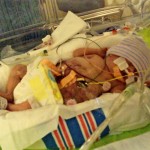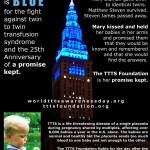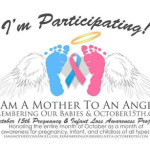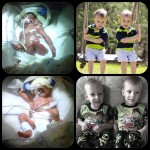If you have found this page because one of your twins has been diagnosed with hydrops fetalis caused by TTTS, I am very sorry.
The prognosis is bleak. However, it is not over and there are cases in which laser surgery has reversed the hydrops. So, do your research, be informed, seek more opinions if you’re not happy with what your doctor tells you, and go to the expert – Dr. DeLia. Don’t give up on your babies.
But also, you need to be prepared for the worst. While I encourage you to be optimistic, I advise you to consider all outcomes. It will help you learn to adjust and handle this situation. At least a little bit.
There was not a lot of information available about hydrops when we received our diagnosis. Everything I read was frightening and seemed to point to imminent death. There was this article from 1999, which was not optimistic.
I was depressed and felt so alone. But I did not want to give up on my sweet girls.
My daughter Kathryn died two days after birth from the complications of TTTS. Specifically, she developed what is called hydrops fetalis caused by TTTS, or more commonly just called hydrops.
This article describes hydrops very well.
Hydrops fetalis is the name of a condition or symptom. It is not a disease in and of itself, but rather a complication of other conditions. Hydrops fetalis is an abnormal collection of fluid in at least two different fetal compartments. These compartments or spaces can be fluid collection in the abdominal cavity (ascites), around the heart (pericardial effusion), and/or lungs (pleural effusion), or generalized edema or swelling of the skin and throughout the body (anasarca), as well as polyhydramnios (excess amniotic fluid) and placental thickening.
Hydrops fetalis is a condition in the fetus characterized by an abnormal collection of fluid with at least two of the following:
- Edema
(fluid beneath the skin, more than 5 mm). - Ascites
(fluid in abdomen) - Pleural effusion
(fluid in the pleural cavity, the fluid-filled space that surrounds the lungs) - Pericardial effusion
(fluid in the pericardial sac, covering that surrounds the heart)
In addition, hydrops fetalis is frequently associated with polyhydramnios and a thickened placenta (>6 cm).
Babies with TTTS may develop hydrops because of the following reason:
As a result of sharing a single placenta, the blood supplies of monochorionic twin fetuses can become connected, so that they share blood circulation: although each fetus uses its own portion of the placenta, the connecting blood vessels within the placenta allow blood to pass from one twin to the other. Blood can be transferred disproportionately from one twin (the “donor”) to the other (the “recipient”). The blood volume of the recipient twin is increased, which can strain the fetus’s heart and eventually lead to heart failure, and also higher than normal urinary output, which can lead to excess amniotic fluid (becoming polyhydramnios). This causes nonimmune hydrops.
This is Kathryn after birth. When she was born, her belly was distended with the extra fluid. Her skin was terribly stretched out and bruised and she was swollen from the excess fluids in her abdomen and around her heart. Because her belly had been so full of fluid, her lungs were not able to develop to the size they needed to support her body.
They were unable to stop the fluid from continuing to build up. She was never able to be stabilized.
The mortality rate for babies with hydrops is very high. 60-90% of babies with hydrops will die. And the earlier it is diagnosed, the worse the prognosis.
If the baby survives to delivery, these babies with hydrops have a distinctive appearance at birth. The babies born with hydrops are very swollen with a large round abdomen due to the fluid collection in the abdominal cavity. Often, these infants will have severe respiratory distress or breathing problems due to a variety of causes. Many have lungs that did not develop completely. This is thought to be a result of limited space in the chest from fluid collecting around the lungs and from a swollen liver and a diaphragm that is pushed upward from the fluid that collected in the abdomen. The polyhydramnios (larger than normal volume of amniotic fluid) may interfere with normal fetal breathing movements also. The smaller than normal lung size results in altered blood flow through the lungs, and higher than normal blood pressure in the lungs. This increased pressure in the lungs limits blood flow through them and limits gas exchange with breathing. The lungs need to rid the blood (and ultimately the body) of carbon dioxide and add oxygen into the blood. Many of these babies have fluid collection around the lungs and/or heart, which complicates already compromised breathing and heart function. Another common complication for these infants is severe low blood sugar (hypoglycemia), which is thought to be the result of altered function of cells in the pancreas. The cause of this altered function is not well understood. Hypoglycemia or low blood sugars put these babies at risk for seizures, apnea and potentially brain injury if not treated quickly. If the underlying cause of the hydrops can be linked to anemia, the baby is at an increased risk of developing hyperbilirubinemia. This problem can become severe very quickly and can potentially cause neurologic injury. ~ Children’s Hospital of Wisconsin
What is my baby’s long-term prognosis?
Long-term prognosis is guarded. These babies are critically ill even if they do survive to birth. Of the fetuses diagnosed prenatally, only about 20 percent survive to delivery. Of this number, approximately half will survive the neonatal period. Long-term survival for those that make it through the newborn period is based on the underlying cause of the hydrops. The data currently shows an optimistic outlook for those babies who do survive.
What should I do?
I don’t share this information to completely scare you to death, although it is very, very scary. I share this because I will never stop feeling guilty that I feel like I did not do enough for my babies. I did not press for more information and more opinions. I did not seek the advice of experts and specialists and was naive enough to think that my perinatal specialist was an expert. (He was not.)
While you may not be able to change your outcome, you should do all you can to TRY.
We were advised several times to terminate one or the other twin. At first, it was the donor baby (who is now 2.5 years old, and a healthy, happy girl.) Later it was Kathryn, because her situation looked so dire. Because I did not want to give up AND because they could not definitively tell me that it would not harm Tiny, I could not say yes to that solution.
I spent five weeks on 24/7 hospital bedrest so that the heart rates could be monitored. The girls hung in there until 30 weeks and 5 days.
Kathryn was with us for two days. We were able to take pictures, touch her, see her, and hold her as she passed.
Those two days were a blessing in so many ways.
I am forever thankful that I had them.
I pray for you a different outcome if this is a situation you face.
And I am here for you all the way.
Never give up hope!
xoxo
Take Action! Early Ultrasounds Can Save Lives!
Related articles
Related Posts
Latest posts by katbiggie (see all)
- What to say when a baby dies ; words of comfort - October 31, 2019
- Try listening to her, not fixing her – October 15th - October 15, 2019
- Pregnancy & Infant Loss Awareness Book Bundle - October 3, 2019






















 Michael Ray Overby says
Michael Ray Overby says
January 22, 2015 at 9:24 pmThank you for a very Direct & Uncompromising look at the Scourge of Hydrops Fetalis. In Singleton this is generally an indication of Severe CHD, as it can be in the TTTS Recipient Twin. The statistical prognosis is indeed Bleak, however the usual outcome is not Inescapable. Consultation with more than one expert & aggressive treatment of underlying causation wherever possible has been seen to make a difference in Hydrops Fetalis HF’s outcome.